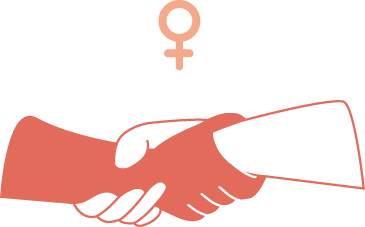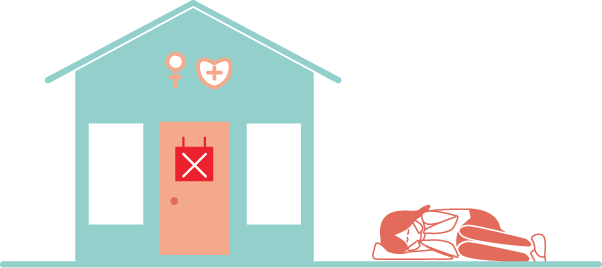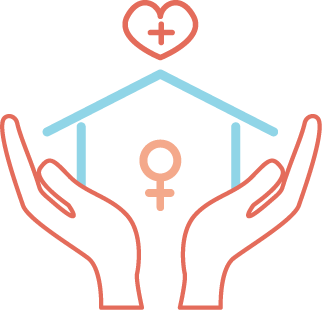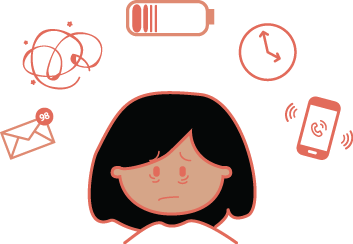Montreal Women’s Right to Housing: We’re Working on It, Are You?
Supporting Women in Need Throughout the Pandemic and Housing Crisis
 Lockdowns left many women trapped in abusive and violent situations. Public health measures upended the strategies used by women experiencing or at risk of homelessness.
Lockdowns left many women trapped in abusive and violent situations. Public health measures upended the strategies used by women experiencing or at risk of homelessness.
The pandemic and housing crisis also created significant barriers to accessing resources for support. Women who could access services were more exhausted than usual and dealing with fraying mental health. The lack of space in women's shelters, already a problem before the pandemic, only intensified since March 2020. Many women were forced to turn to resources that did not meet their needs or stay in places where they felt unsafe.
Organizations have been supporting more and more women experiencing or at risk of homelessness. The pandemic and the housing crisis have intensified women's needs and made it more complicated to reach them and support them with their next steps. This context has also had significant repercussions on working conditions, even with access to emergency funding.
Intensification of Violence During the Pandemic
Women's groups have noted an intensification of intimate partner violence since the pandemic began. Lockdowns and curfews have trapped many women in violent situations.
"Violence has increased. It happens more quickly and is generally more severe (more assaults, aggravated assaults, death threats, attempted murders, etc.)." (Multi-Femmes)
As reported by many of the groups we surveyed, it's challenging to have an accurate portrait of the situation because we don't know the extent of what we don't know. We do know with certainty that calls to support helplines have increased (Mélanie Julien 2021). The organization SOS Violence Conjugale received 41,000 calls during the first year of the pandemic, increasing 7,000 over their regular rate (Carrier 2021). As of November 24, 18 femicides were committed in 2021. The same intensification of violence was also observed in mistreatment by caregivers and abuses from landlords and superintendents.
This violence has led to an increase in the number of women experiencing "hidden homelessness." They end up living in housing where their safety is compromised daily. Multiple studies have shown that women's entry into homelessness is marked by violence from intimate partners and violence against women (Flynn et Cousineau 2021).
Survival Strategies Upended for Women Experiencing or at Risk of Homelessness
In our focus groups, many indicated that many women did not have access to safe and stable housing before the pandemic. COVID-19 accentuated these women's distress. Even as the needs within communities increased, many resources and organizations had to reduce, reorganize (pivoting to phone or online models) or interrupt their services to respect public health measures. Multiple organizations reported losing contact with some women when they had to close their doors during the first wave of the pandemic.
Above all, health measures disrupted survival strategies for women experiencing homelessness or at risk for homelessness. For women experiencing hidden homelessness, lockdowns made it impossible to couchsurf or stay with friends and family. Health measures also impeded access to safe public spaces and free or low-cost services. Before the pandemic, these women would use libraries, malls, drop-in centres, and community cafeterias or 24-hour restaurants to relax, drink water, access bathrooms, heat, air conditioning, etc. It became much more difficult and riskier to use the street economy (e.g., panhandling, sex work, drug dealing) and to pay in cash (e.g., to pay for STM tickets to use public transportation).

Many women were used to finding ways to get by on the street. As a result, they adopted other strategies that sometimes created more significant risks for their health and safety. They camped and spent more time outdoors. This increased the risk of physical or sexual violence, being racially profiled by the police and legal sanctions, especially in the context of the curfew. Indigenous and racialized women, as well as sex workers, experienced especially marked discrimination. Mental health issues and risks associated with drug use also increased.
"It's true. Women no longer had access to their usual spots to warm up, eat or safely spend the day without being seen. Those living on the street had to diversify their efforts: some went to shelters and centres they were already familiar with, others went to emergency spaces established by the city, others went to safe-injection sites, stayed with clients, or lived with friends and family who were sometimes also experiencing difficulty. Many stayed on the street...There was also the situation with the encampment in Hochelaga, which was another option some had chosen." (La rue des Femmes)
"Women are trapped in their apartments, often without access to a vehicle, without internet access (or with poor-quality access) and sometimes in violent situations. Museums and libraries, among others, were valued for their internet access and free or low-cost resources. They live in cramped apartments without much light, which negatively affects their well-being at home. This can also compromise confidentiality for remote interventions." (Centre de solidarité lesbienne)
Others stayed with or went back to living with friends, relatives, or partners exposed to abusive or violent situations. Multiple support workers also mentioned that women tolerate this violence for extended periods due to the pandemic, which explains the downturn in shelter requests for specific organizations. The surveyed organizations and discussion groups identified a series of obstacles to leaving a violent situation:
Les organisations sondées et les groupes de discussion ont identifié un ensemble de freins à la possibilité de quitter une situation de violence :
- being in lockdown with a violent person, which limits their ability to ask for help;
- financial dependence, especially for women who lost their jobs;
- a lack of knowledge regarding existing resources;
- the impression that shelters are closed or do not have space available;
- fear of having to reveal their sexual orientation or gender identity and, as a result, experience microaggressions;
- fear of losing housing, especially for women in social housing;
- fear of winding up on the street;
- fear of contracting COVID-19 in a shelter;
- isolation, especially for women who are refugees or lack access to a car or the internet;
- fear of not finding housing after leaving a shelter.
To overcome these obstacles, organizations put new practices in place, including phone and text message support. Some pharmacies contributed to the movement by providing safe spaces to contact SOS Violence Conjugale confidentially.
Workers noted that women who made use of shelter services were more exhausted than usual. Generally speaking, women's mental health significantly deteriorated over the past few months due to isolation, stress, increased drug use and more incredible difficulty accessing health care, among other reasons. The result has been anxiety, exhaustion, paranoia, depression, suicidal ideation, etc. These mental health issues have impacts on housing stability. Firstly, they lead to increased disorganization for some, which results in housing issues or even eviction (unsafe conditions, excessive noise, conflicts with neighbours, etc.). Secondly, it becomes more challenging to get support in finding housing. Thirdly, it is more complicated to track down housing that offers an adequate level of support for the renter's needs and level of autonomy.
Women's Group Shelter Services
Before the pandemic, women already had difficulty accessing shelter due to a flagrant lack of space in single-gender housing. In Montreal, the number of denied requests in shelters for women experiencing difficulty nearly doubled in the last decade, going from 17,871 to 36,158 from 2010 to 2019 (Partenariat pour la prévention et la lutte à l’itinérance des femmes 2019).
"Shelter resources that we refer requests to are often just as full and unable to respond to the demand in a timely manner. How can you work with that when this person is being shuttled from one resource to another due to the lack of space?" (Comité d’action des citoyennes et citoyens de Verdun)
"We turn down multiple shelter requests every day. To give an example, for the year 2019-2020, we denied 6,303 shelter requests due to lack of space." (Auberge Madeleine)

Specific neighbourhoods are significantly affected by this shortage of spaces (e.g., Montréal-Nord and Mercier-Est). There is a lack of shelters with inclusive infrastructure and services adapted to various needs. This issue affects, among others, women who are sexual and gender minorities, living with a disability, drug users, sex workers, living with their children, living with pets, considered to have a severe mental illness, or not French- or English-speakers (Dufort 2019).
While shelters were already overwhelmed, health measures have reduced their capacity and complicated access (for example, through quarantines). The lack of shelter space for women was brought up by multiple organizations, both in discussion groups and the questionnaire. They operate at maximum capacity and are forced to turn women away:
"We had to deny 96 shelter requests from April to December 2020." (Le Parados)
"On average, we receive 20 shelter requests per week that we're unable to respond to. It's very sad and speaks to obstacles in housing access and the need for community support for women experiencing difficulty." (Les Maisons de l’Ancre).
Some organizations say they were unable to find shelter for some women. Due to a lack of space, some women opted for resources that weren't suited to their needs, such as mixed-gender shelters where they did not feel safe or organizations that are not trained to work with sexual or gender minority service users. Women who are sexual minorities hesitate to use some services and resources because the majority of violence they experience takes place in the public sphere (public spaces, work, educational institutions and public services) (Fontaine, Antoine, et Vaillancourt 2021). As for women living with a disability, the lack of accessible resources forces them to stay in violent situations, turn towards loved ones, or use housing resources for seniors (Conseil des Montréalaises, 2019).
Emergency Measures
In Montreal, emergency measures were put in place in response to the waves of COVID-19 in the spring and winter, and these resources only provided a partial response to the needs exacerbated by the pandemic. Women's groups were not listened to, and their expertise and recommendations were not fully integrated, despite their being regularly consulted on questions related to homelessness.
Let's take the example of temporary shelters. These resources, which some women used, were still based on models designed for a predominantly male population. Most didn't allow users a minimum comfort level: individual rooms, hot meals, showers, forced wake-up time, etc. These shelters had a strong presence of security rather than psychosocial support staff. On top of that, they did not systematically include safe, single-gender zones. During the first wave, only one shelter was solely dedicated to women, and it was the only one that wasn’t open 24 hours from the start.
We fear that women will have yet another reason not to use these resources and instead go back to living with a violent person, especially as encampments are regularly dismantled. As mentioned earlier, shelters are regularly overwhelmed, year after year, winter and summer, pandemic or not. Many women's shelters still do not receive funding for all of the spaces they offer and find the emergency measures lacking (Partenariat pour la prévention et la lutte à l’itinérance des femmes 2019). They need adequate and recurring funding to support women experiencing difficulties, which would prevent them from relying on emergency measures year after year.
Finding Adequate Housing

After staying in a shelter, many women want to leave their violent relationships for good or regain stable housing. Community groups support them in their search for housing that corresponds to their needs to feel at home. Depending on their missions, these groups help women access social housing by providing lists, accompaniment, references, help filling out forms, etc. They support them in searching for housing on the private market by offering help with their search, research clinics, preparing for visits, loans of computer equipment for internet searches, etc. Some organizations will also help women by providing essential supplies (bedding, dishes) and moving services.
"Support workers help women find housing by giving them references to start with. They will also help them respect their tax obligations (submitting their tax returns), so they can be eligible for social housing." (Logifem)
"During their stay at the Auberge, we provide support to women who want help in their search for housing, whether on the private market or to request social housing. For example, we offer weekly workshops on finding housing led by a support worker. Also, for interested women, we can refer them to long-term subsidized housing and support them in their request and in obtaining the documents they need for that." (Auberge Madeleine)
Organizations struggle to find housing that meets the urgent needs of their service users. Service users have no choice and must take whatever available housing is offered to them. These units are often geographically distant from services and support networks, too small, or simply not to their taste.
According to our questionnaire, 67% of groups that offer shelter or housing for women in Montreal have had to increase the length of stays in short-term or interim housing, particularly due to the housing crisis. This measure, which seeks to provide women with more time to find adequate housing or to obtain a space in social housing, has become increasingly common during the pandemic. While a caring gesture, it contributes to resource congestion.
Multiple surveyed groups highlighted the complexity involved in supporting and accompanying women who experience multiple forms of oppression. In addition to the lack of affordable, adaptable and adequately sized housing, other obstacles to finding housing include language barriers, inaccessible websites, etc. For organizations, this support is demanding, especially when housing needs must be coordinated with other issues (e.g., mental health, drug use, legal antecedents, youth protection services, home support, and post-incarceration requirements). In a pandemic, supporting women remotely constitutes a challenge in and of itself, especially for those who don't have phone or internet access.
Finding accessible and adaptable housing is especially difficult. There is no centralized and comprehensive resource for finding accessible and adaptable housing in Montreal nor providing waiting lists for people who need it. This makes accessible, adaptable or adapted housing units challenging to allocate to people living with disabilities, both for private landlords and organizations responsible for social and community housing (Conseil des Montréalaises 2019).
Actions and Services to Prevent Homelessness
At the present moment, there is a lack of culturally adapted services for Inuit and First Nations women. The most frequently requested services among those who visit organizations working in homelessness are spiritual healing services and Indigenous peer support, and physical and mental health services (Latimer, Bordeleau, et Méthot 2018).
More and more organizations offer post-shelter support to ensure housing safety and stability. This support, paired with a shelter stay, has demonstrated its worth, particularly for those who have experienced homelessness, use drugs or live with mental health issues (Gabet et al. 2020). Yet the combined lack of funding, cooperation with public services and affordable housing constitute significant impediments to offering this support to a larger number of women.
Beyond post-shelter services, organizations are increasingly supporting women experiencing or at risk of homelessness (Partenariat pour la prévention et la lutte à l’itinérance des femmes 2019). Stoppages and reductions in on-site services for many community organizations had significant repercussions on the mental health and bonds developed with women who had been accompanied in their next steps. With evolutions in health and safety norms and the recognition that community groups offer essential services, several in-person activities were able to resume, including support groups, coffee meet-ups, excursions, art therapy workshops, etc.

This return to in-person work was very much appreciated after months of lockdowns. Women could regain a space for stability where they could break their isolation, which helped them establish and maintain housing stability. However, women's groups no longer had the exact schedules or the same flexibility for drop-ins. Due to health measures, most activities were limited to a set number of participants, who were required to sign up in advance. Many women without telephones or internet access could not keep up with these changes and register for activities.
Working Conditions Put to the Test by the Pandemic
Community support workers played an essential role during the pandemic. Yet their role is not appropriately recognized—they are relegated to the background and are poorly paid. "COVID bonuses" were allocated during the first wave, but most ended during the summer of 2020. Some organizations still adopted measures to help compensate for work performed through this challenging period (e.g., paid time off, gifts or bonuses).
As we highlighted earlier, supporting women is a demanding task. The many obstacles limiting this support (excluded programs, lack of space, discrimination, waiting lists, etc.) create an enormous sense of powerlessness, as some needs need to be prioritized over others.
"These are long, demanding and complex interventions, which often require coordination or collaboration with other resources. Sometimes it's difficult to prioritize a response to one particular need rather than another. There's a feeling of powerlessness when we feel unequipped to adequately and quickly respond or when we get a sense of the urgency of the situation at hand. We aren't able to offer tools or references to urgent needs." (Comité d’action des citoyennes et citoyens de Verdun)
"It's always difficult and complex when we work with Deaf women who need to find housing. They often experience multiple forms of discrimination and, unfortunately, we don't have the ideal allies and resources needed to help us adequately support these women in precarious situations." (Maison des femmes sourdes de Montréal)
Our focus groups revealed intense exhaustion, even distress, among support workers, and many took leaves of absence or simply left. The pandemic and the constant state of emergency that came along with it prevent organizations from adequately training and welcoming new employees, ultimately harming their ability to support women in their next steps.

More than twenty groups that provide housing or shelter to Montreal women said they had access to emergency funding from the government. Most groups used these funds to create services or resources to support women experiencing significant challenges related to isolation or food insecurity and mobility (e.g., meal delivery services, online support, taxi transportation, gift cards, and hiring an additional support worker). Organizations also purchased personal protective equipment and maintenance supplies (e.g., masks, hand sanitizer, sinks, additional cleaning costs). Lastly, many used emergency funding to purchase equipment to support teams and improve their working conditions (e.g., "COVID bonuses," remote work equipment, paying overtime).
Some groups flagged that their organization was not eligible for these funds. Others criticized the fact that programs are often oriented towards equipment purchases, and their organization could not submit requests quickly enough. In addition, these programs were not recurring and thus did not affect the problem of chronic under-funding in the slightest, despite the impediments it poses to hiring and retaining staff, as it's often difficult to offer good working conditions or full-time positions over the long term.
"Organizations were able to make use of emergency funds in the spring of 2020, even if the allocated amount was insufficient for the needs of Montreal-based groups. The new funding was announced in the summer, but the criteria excluded many groups. Organizations had to demonstrate deficits caused by the pandemic, but community organizations can't spend money that they don't have! As a result, many turned down the funding as long as other groups weren't eligible. In the end, despite the desperate need, only 10% of the budgeted amount was allocated to Montreal organizations. When groups and associations pushed for access to the undispersed funds and a loosening of criteria for access, the Ministère de la Santé et des Services sociaux flatly denied this request, stating that need had not been adequately demonstrated. But we had repeated over and over that the field needed more support to adapt or increase their activities to meet new needs, to apply health measures and to cover losses of income sustained during the pandemic." (Réseau d'action des femmes en santé et services sociaux)
References
Carrier, Léa. 2021. « Une année record pour SOS violence conjugale ». La Presse, 10 avril 2021. https://www.lapresse.ca/actualites/2021-04-10/une-annee-record-pour-sos-violence-conjugale.php.
Conseil des Montréalaises. 2019. « Se loger à Montréal: Avis sur la discrimination des femmes en situation de handicap et le logement ». https://bit.ly/3xounFw.
Dufort, Julie. 2019. « Pratiques d’ouverture envers les jeunes LGBTQIA2S en situation d’itinérance ». Guide destiné aux organismes d’aide en itinérance ou qui œuvrent auprès de personnes à risque d’itinérance. Coalition des groupes jeunesse LGBTQ+. https://coalitionjeunesse.org/wp-content/uploads/2019/11/guide-itinerance-nov2019-final.pdf.
Flynn, Catherine, et Marie-Marthe Cousineau. 2021. « Violence faite aux femmes de la part de partenaires intimes et itinérance : mieux comprendre pour intervenir de façon concertée ». Rapport de recherche action concertées. FRQSC. https://www.fmhf.ca/sites/default/files/upload/documents/publications/cousineau_flynn_rapport_violence-femmes-itinerance.pdf.
Fontaine, Eugénie, Julie Antoine, et Julie Vaillancourt. 2021. « Enquête 2020: portrait des femmes de la diversité sexuelle au Québec ». Réseau des lesbiennes du Québec (RLQ). https://bit.ly/3l9PIh0.
Gabet, Morgane, Guy Grenier, Daniela Perrottet, et Marie-Josée Fleury. 2020. « Le soutien postlogement transitoire auprès des femmes en situation d’itinérance : besoins, implantation et impact d’une étude pilote ». Santé mentale au Québec 45 (1): 79‑103. https://doi.org/10.7202/1070242ar.
Latimer, Eric, François Bordeleau, et Christian Méthot. 2018. Besoins exprimés et préférences en matière de logement des utilisateurs autochtones de ressources communautaires sur l’île de Montréal. Montréal (Québec): Centre de recherche de l’Hôpital Douglas. http://reseaumtlnetwork.com/wp-content/uploads/2019/02/Besoins-pre-fe-rences-logement-Autochtones-Version-16-fe-vrier-1.pdf.
Mélanie Julien. 2021. « Les violences faites aux femmes en période de crise sanitaire ». Conseil du statut de la femme. avril 2021. https://csf.gouv.qc.ca/article/publicationsnum/les-femmes-et-la-pandemie/societe/les-violences-faites-aux-femmes-en-periode-de-crise-sanitaire/.
Partenariat pour la prévention et la lutte à l’itinérance des femmes. 2019. « Femmes et itinérance 2019: dossier de presse ». https://lesmaisonsdelancre.org/wp-content/uploads/2019/11/Dossier-de-presse-Femmes-et-itine%CC%81rance-en-2019.pdf.